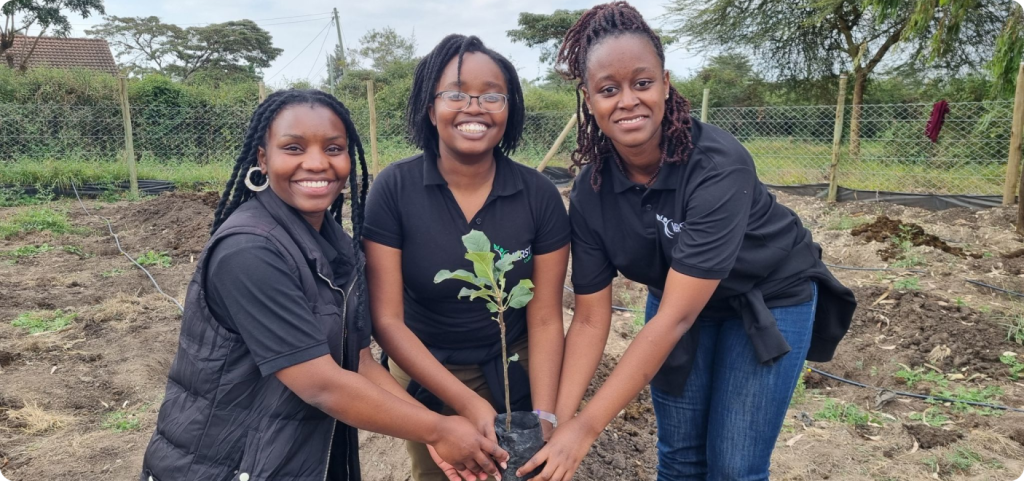Country: Kenya
UNEP-Finance Initiative - #15BillionTrees initiative Capacity Building.
About The Training
In October 2023, Verst Carbon, in collaboration with UNEP – Finance Initiative, facilitated a capacity building program in support of the Kenyan government’s #15BillionTrees initiative. This initiative, which is part of the government’s broader effort to plant 3 billion trees, focuses on using tree plantations—particularly fruit trees—as a means for carbon sequestration.
The training program provided a comprehensive understanding of carbon markets, emphasizing the environmental and economic potential of fruit tree plantations. The program aimed to equip participants with the knowledge and skills required to engage in carbon markets. while contributing to Kenya’s climate action goals and ecosystem restoration efforts.
The Problem

Kenya, like many countries, faces significant environmental challenges, including deforestation, soil degradation, and the increasing impacts of climate change. The government’s ambitious tree-planting goal is central to addressing these issues, but achieving this target requires more than just planting trees. It demands a clear understanding of how carbon markets function and how tree plantations, especially fruit trees, can contribute both to carbon sequestration and economic growth. However, stakeholders—including local communities, investors, and policy makers—often lack the knowledge and tools to effectively participate in carbon markets. Additionally, many stakeholders are unaware of the potential economic benefits that can be derived from fruit tree plantations, which offer both environmental services through carbon sequestration and income generation through fruit production.
The Solution

The #15BillionTrees Capacity Building program was designed to address these gaps by providing participants with a holistic understanding of carbon markets, investment strategies, and the multiple benefits of fruit tree plantations. The training offered a practical approach to carbon finance, focusing on the dual goals of enhancing ecosystem restoration and creating economic opportunities for communities through sustainable agriculture. Key components of the training included:
Understanding Carbon Markets
Participants were introduced to the fundamentals of carbon markets, including how carbon credits are generated through tree planting projects, particularly fruit tree plantations. This module covered the importance of additionality, baselines, and Monitoring, Reporting, and Verification (MRV) protocols in ensuring that tree planting projects are recognized and valued in carbon markets.
Fruit Trees and Carbon Sequestration
The program highlighted the unique benefits of fruit trees in carbon sequestration. In addition to absorbing CO2, fruit trees contribute to food security and economic stability by providing fruit for local markets. This dual purpose makes fruit trees an attractive option for both carbon finance and sustainable agriculture, particularly for smallholder farmers.
Investment and Economic Benefits
The training emphasized how stakeholders can attract investment into fruit tree plantations by leveraging carbon credits. This section covered practical strategies for securing investment, engaging with local communities, and ensuring that tree planting efforts are economically viable in the long term. Participants also learned how to measure the economic returns from fruit tree plantations alongside their carbon sequestration benefits.
Ecosystem Restoration and Sustainable Agriculture
The workshop included practical exercises on how to integrate tree planting into broader ecosystem restoration efforts. This included understanding the role of fruit trees in improving soil health, reducing erosion, and enhancing biodiversity. Participants were also guided on best practices for planting, maintaining, and scaling up tree plantations in different regions of Kenya.
Impact Made So Far
The capacity-building initiative under the #15BillionTrees program had a significant impact on a diverse group of stakeholders, ranging from local farmers and community leaders to investors and policymakers. Key outcomes include:
Increased Engagement with Carbon Markets
Participants left the program with a clearer understanding of how to develop, manage, and benefit from carbon offset projects through tree planting. They gained the skills to measure carbon sequestration and navigate the complexities of carbon market participation, ensuring that they can actively engage in Kenya’s broader climate action agenda.
Economic Empowerment through Fruit Trees
By highlighting the dual benefits of fruit trees, the program demonstrated how carbon sequestration can be linked with income generation. This knowledge is expected to lead to increased investment in fruit tree plantations, providing both environmental and financial benefits for communities across Kenya.
Supporting Kenya’s Tree-Planting Agenda
The training directly supported the Kenyan government’s goal of planting 3 billion trees by equipping key stakeholders with the tools and knowledge to contribute to this national effort. Through their engagement in carbon markets and sustainable agriculture, participants will play a critical role in scaling up tree planting initiatives.
Fostering Sustainable Practices
The focus on ecosystem restoration ensured that participants understood the broader benefits of tree planting beyond carbon sequestration. By integrating sustainable agricultural practices, the program promoted a holistic approach to land use, ensuring that tree plantations contribute to long-term environmental health.